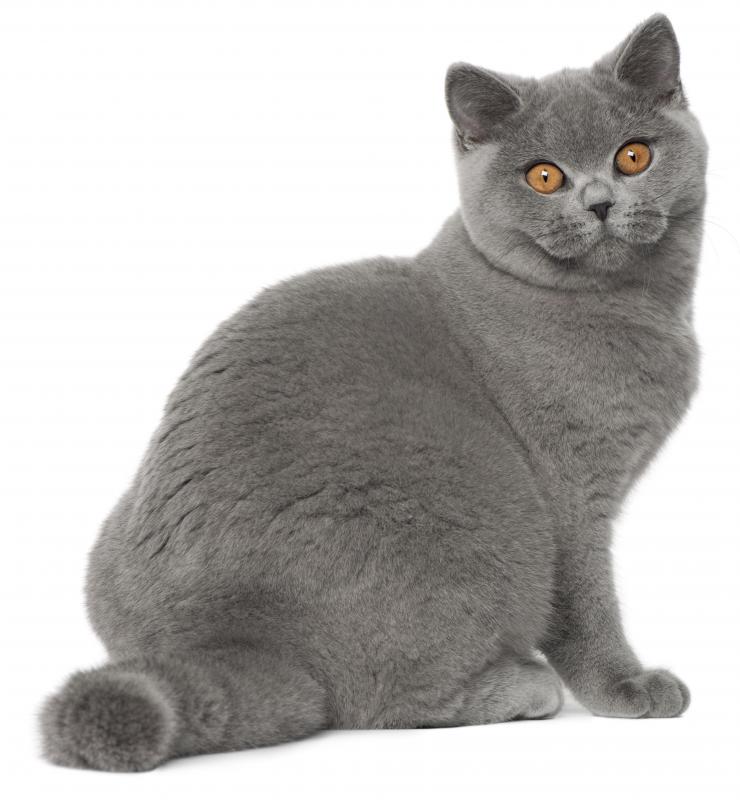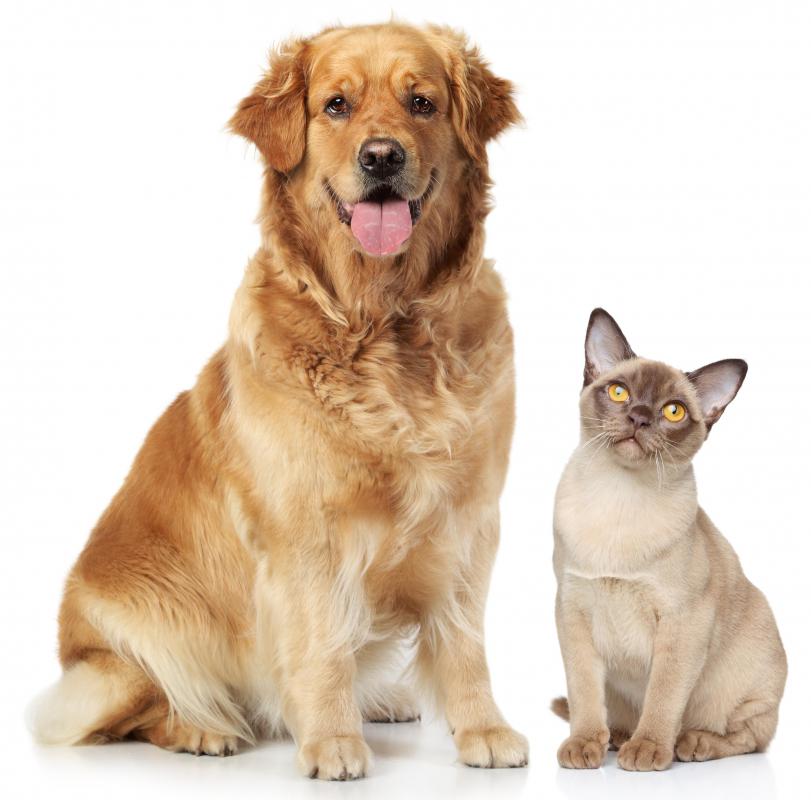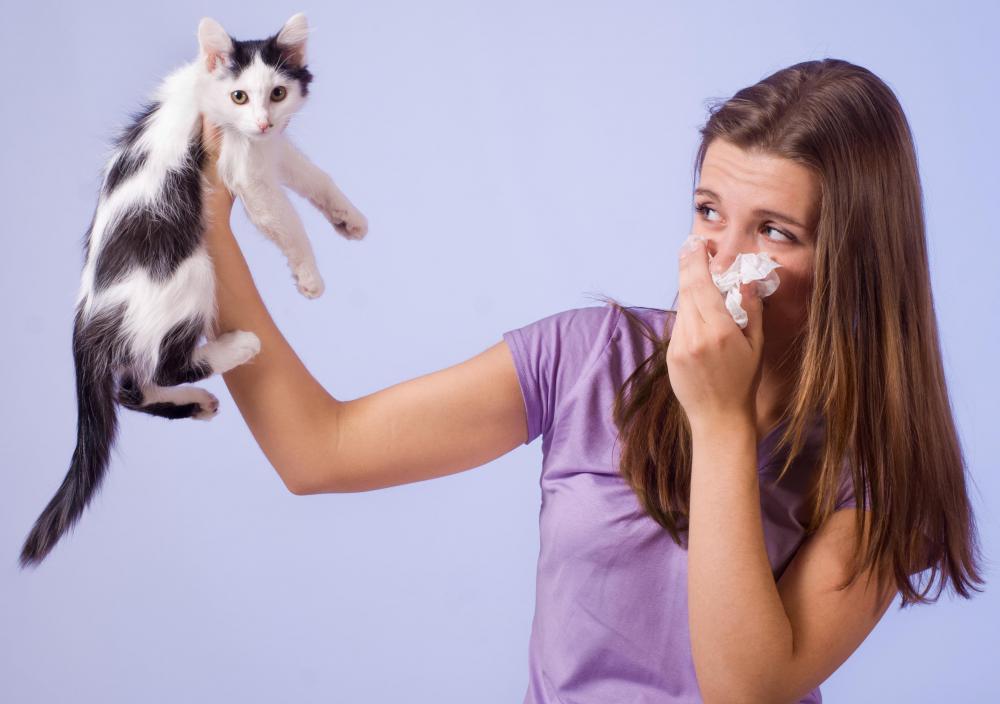At AllThingsNature, we're committed to delivering accurate, trustworthy information. Our expert-authored content is rigorously fact-checked and sourced from credible authorities. Discover how we uphold the highest standards in providing you with reliable knowledge.
Can You get a Hypoallergenic Cat?
It is possible to get a hypoallergenic cat, although there are some caveats involved in the purchase of hypoallergenic cats which should be carefully considered. Primarily, the issue is that “hypo” means “less,” not “none,” so a hypoallergenic cat is less likely to cause allergic reactions in people with cat allergies, rather than being free of all potential allergens. This means that for someone with severe allergies, a hypoallergenic cat could still represent a health risk.
Before searching specifically for a hypoallergenic cat, it can pay to confirm that allergies are genuinely being caused by a cat. There are a wide range of causes and factors involved in allergies, and it can take time and money to narrow down specific allergens. General practitioners are often inclined to zero in on common allergens like pets when a patient presents with allergies, rather than recommending an allergy specialist who can precisely identify the cause of an allergy. For someone recently diagnosed with a cat allergy who loves cats, investing in allergy testing may be less costly than obtaining a hypoallergenic cat.

Cat allergies appear to be caused by proteins which are secreted by the sebaceous glands in the skin. These proteins enter the air in the cat's dander, the dead skin and hair shed by the cat. Hypoallergenic cats tend to have less fur than regular cats, reducing the amount of dander, and they may shed less as well. Some breeds appear to produce less of the allergenic proteins than conventional cats.

Several cat breeds appear to be hypoallergenic. Hypoallergenic breeds include: Siberians, Russian Blues, Sphynxes, Cornish Rexes, Devon Rexes, LaPerms, Balinese, Javanese, and Oriental Shorthairs. These cat breeds have a range of appearances and body types. At least one company has also made claims that it has genetically engineered a hypoallergenic cat, although these claims have been difficult to substantiate due to lack of peer review.

Some animal activists have raised concerns about the demand for hypoallergenic cats, arguing that it feeds a larger demand for purebred animals. Breeding of cats and dogs is a significant bone of contention, so to speak, in some areas of the world because some people feel that breeding decreases genetic diversity while also contributing to the large numbers of homeless pets around the world. People who do want to purchase a cat from a breeder should seek out a reputable facility, or consider obtaining a hypoallergenic breed from a purebred rescue organization.
Frequently Asked Questions
What does 'hypoallergenic cat' mean?

A hypoallergenic cat is one that is less likely to trigger allergies in humans. While no cat is completely allergen-free, hypoallergenic cats produce fewer allergens than others. Allergens are typically found in a cat's dander (dead skin cells), saliva, and urine. Hypoallergenic cats may have a fur type or produce less of the protein Fel d 1, which is a common allergen.
Are there any truly hypoallergenic cat breeds?

While no cat breed is 100% hypoallergenic, some breeds are known to produce fewer allergens. Breeds like the Siberian, Balinese, and Russian Blue are often recommended for allergy sufferers. According to the Asthma and Allergy Foundation of America, these breeds produce less Fel d 1 protein, which may reduce allergic reactions.
Can regular grooming reduce allergens in cats?

Regular grooming can help reduce the amount of dander and loose hair that can carry allergens. Bathing your cat regularly can also reduce the presence of Fel d 1 on their fur. However, it's important to note that over-bathing can dry out a cat's skin, potentially leading to more dander. Consult with a veterinarian for a grooming routine that's appropriate for your cat.
How can I minimize cat allergens in my home?
To minimize cat allergens, keep your living space clean by vacuuming and dusting regularly. Use a HEPA filter in your vacuum cleaner and air purifier to capture allergens. Wash your cat's bedding frequently and consider using allergen-resistant covers on furniture. Additionally, keeping the cat out of the bedroom can create an allergen-free zone for sensitive individuals.
Is there a way to test my allergy to a specific cat breed?
Yes, you can test your allergy to a specific cat breed by spending time with the breed in question. Visiting a breeder or a household with the cat breed can give you an idea of how you react. However, individual cats within a breed can produce varying levels of allergens, so it's best to interact with the specific cat you plan to adopt.
Are there any medical treatments to reduce cat allergies?
There are medical treatments that can help manage cat allergies. Antihistamines and decongestants can provide temporary relief from symptoms. Allergy shots, also known as immunotherapy, can gradually desensitize the immune system to allergens. According to the American College of Allergy, Asthma, and Immunology, immunotherapy can be an effective long-term solution for many allergy sufferers.
AS FEATURED ON:
AS FEATURED ON:
















Discussion Comments
I've heard that the allergens that cause people to be allergic to cats are also found in the saliva of cats and that is why their fur is bad. Because they lick their own coats and it then carries the proteins around the house.
So, I think that if you have a cat like the Sphinx, it would be pretty hypoallergenic, because it doesn't shed so much hair (the Sphinx is that naked looking cat, although they do have a very short, velvety coat).
I often see rag doll cats on lists of hypoallergenic cats but I'm not sure if they are or not. They are certainly a lovely breed anyway.
I would suggest if you are going to buy a cat and you are worried about allergies, then ask the breeder to let you hold him for a while so you can see what happens. That's the only way to make sure your new cat isn't going to give you the sniffles.
To some extent I feel like people who are allergic to cats just should not have cats. I agree with the animal rights groups who think that too much emphasis on pure bred genetics is bad for the cats.
They end up being too inbred and that can cause all kinds of problems, like disease, or even physical problems.
Those cats with the squashed noses for example often have trouble breathing, and can get nose infections at the drop of a hat.
And the proteins that people are allergic to are probably there for a reason. Hypoallergenic cat breeders might have good intentions, but they should be looking out for the cat first, not the owner.
Post your comments